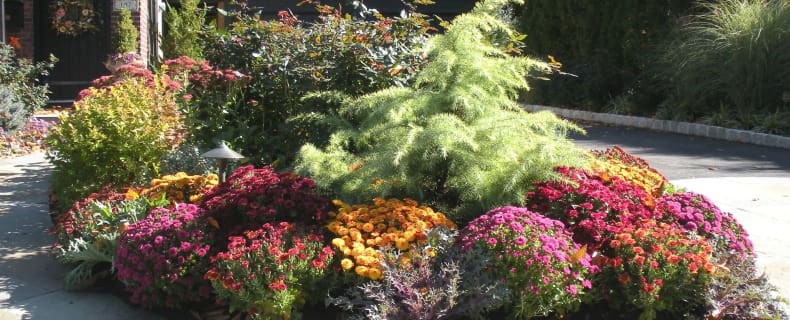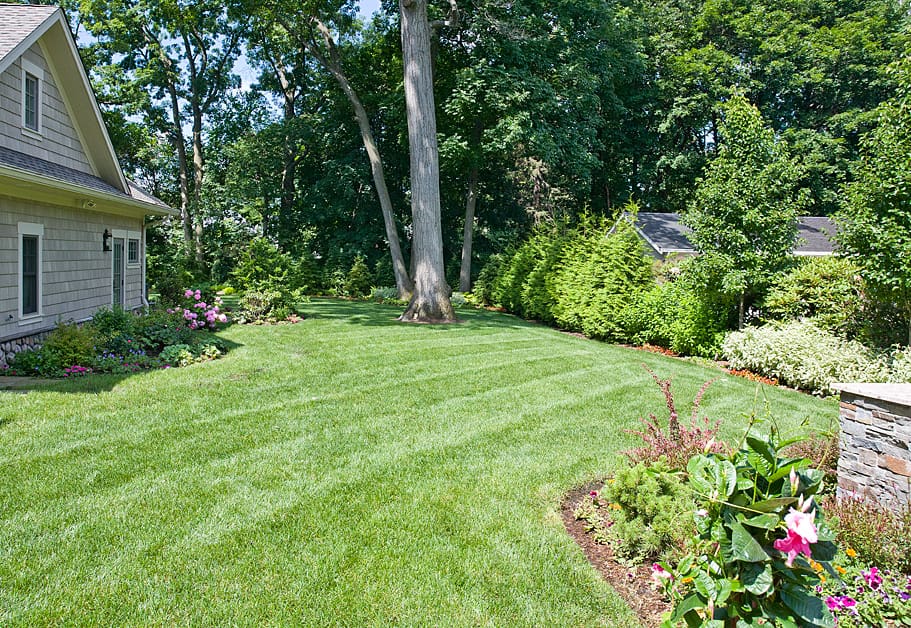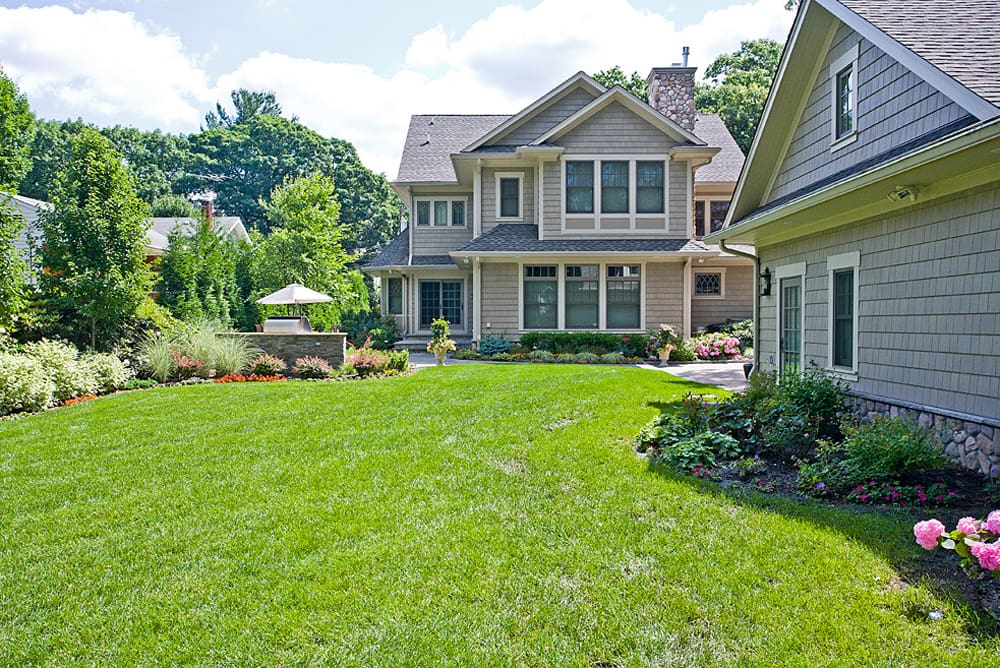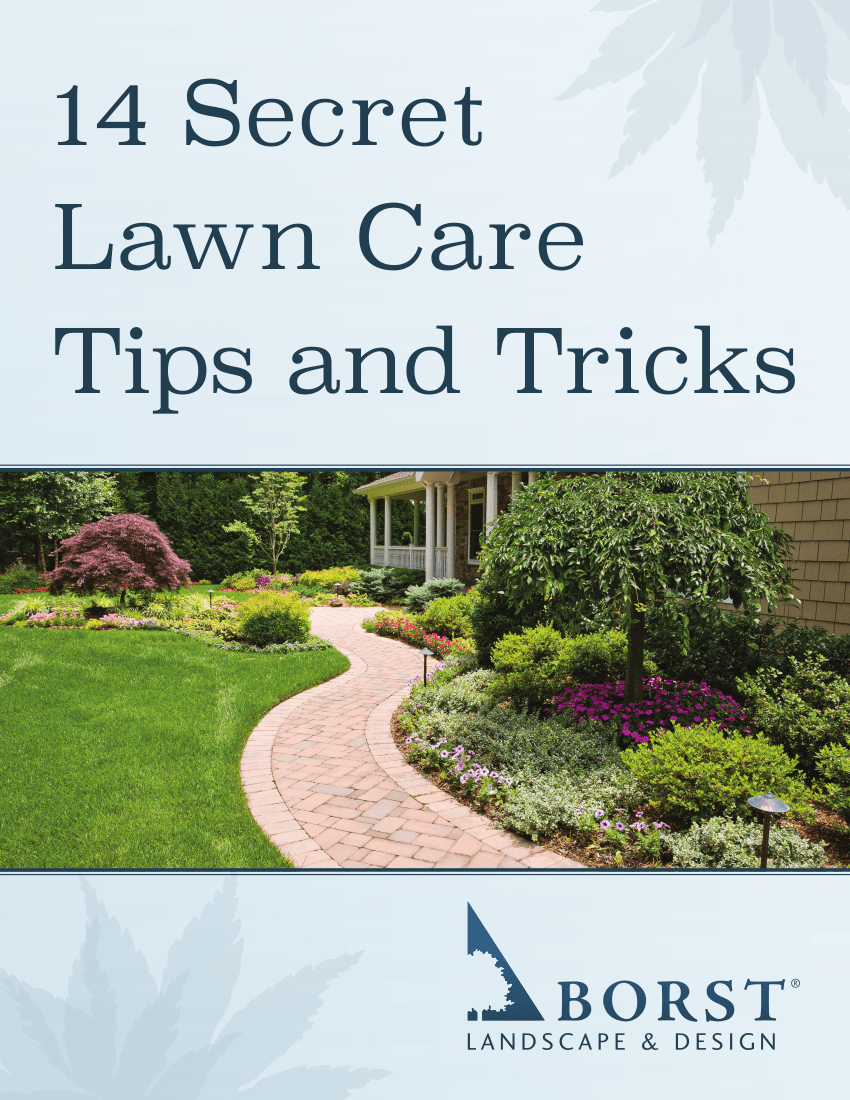 Lawn Care in NJ in the Fall
Lawn Care in NJ in the Fall
As fall season arrives in Northern New Jersey, cooler temperatures will bring wind and rain, falling leaves and less plant growth, but the end of summer doesn’t mean the end of lawn care. After a hot summer, fall is an important time of year for lawn care in NJ that will keep your lawn green and healthy through the end of the year.
Although your grass and plants start preparing for winter dormancy in the fall, you still need to provide essential lawn care and maintenance for a healthy wake-up call in the spring. Proper lawn care in NJ during the fall will help to ensure strong root systems and proper nutrients that will give you a lush, green lawn and stable, healthy plants when spring season rolls around.
Ten Essential Tips Fall Lawn Care in NJ
 1. Fall Yard Cleanup
1. Fall Yard Cleanup
To prepare for winter, it’s important to clean up your lawn and landscape areas before cold weather arrives.
As cooler fall temperatures arrive, your trees will begin to shed their leaves. As winds and rainstorms increase, tree limbs, branches and twigs will fall on your lawn.
To keep you lawn healthy, it’s important to clean up any debris that can kill your grass and attract insects and outdoor pests to your landscape.
- Rake up leaves: Get out your rake and remove all of those dead leaves that have fallen on your lawn. Rake leaves out of plant and flower beds and away from shrubs. Leaves left on your lawn, especially wet ones, can smother your grass and attract insects that cause lawn and plant diseases.
- Clean up debris: Get rid of fallen branches and twigs that have fallen on your lawn. Not only do they create an ill-maintained appearance, but they attract insects and outdoor pests. As cool weather begins, many outdoor pests like field mice, rats and snakes start looking for a warm winter habitat.
 2. Weekly Lawn Mowing
2. Weekly Lawn Mowing
Although your grass will begin to grow at a slower rate in the fall, it still needs regular lawn care in NJ to stay healthy.
After the grass appears brown and dormant, the turf roots are still hard at work absorbing essential moisture and nutrients.
During the fall season, your grass is storing up reserves, so it can survive freezing winter temperatures and thrive in the spring.
During the fall, continue weekly lawn mowing, but set your mower to a lower mowing height of about 1 1/2-inch to 2-inches. Cutting your grass shorter during the fall will reduce the risk of lawn diseases like snow mold and the risk of outdoor pests that can hide in taller grass.
It will also prevent tall grass blades from lying down flat during rainstorms and smothering any new growth or harboring mildew and fungal growth. Shorter fall grass will allow more sunlight to reach the crown of the grass, and there will be less leaf to turn brown during the winter.
Mowing Tip: As you lower your mower height, remember not to trim off more than one-third of the grass blades at any one time. If you prefer, you can gradually lower the cutting height until it’s time for the last two cuttings before winter.
 3. Lawn Aeration
3. Lawn Aeration
During the fall, you should aerate your lawn to help prevent soil compaction in the winter when the ground freezes. Early fall lawn aeration will allow soil and grass roots to get and store essential oxygen, water and fertilizer throughout the winter months.
Lawn aeration reduces thatch, loosens the soil and improves drainage. There are two methods of lawn aeration: spike aerators that simply punch holes in the soil, and plug aerators that take plugs of soil out of the turf.
It’s best to use a plug aerator that will provide more efficient results. Spike aerators often don’t create large enough holes to allow for adequate air, water and fertilizer to reach turf roots. Cool-season grasses, found in most Bergen County lawns, should be aerated in early fall.
For best results, contact a Bergen County landscape professional that provides lawn care in NJ. A professional will have proper lawn aeration knowledge and skill and the most efficient aeration equipment.
4. Wise Watering
Although your grass will begin to grow more slowly, then go dormant, it still needs adequate water to preserve turf roots. Even if you have an automatic sprinkler system, don’t take a hands-off approach to watering in the fall.
To make sure your lawn isn’t soggy or too dry, check moisture levels periodically. Changes in weather and temperature have an obvious impact on soil moisture.
In general, most lawns need about one-inch of water each week for best lawn care in NJ. Water can come from natural rainfall or a sprinkler system. Over-watering or under-watering your lawn can do more harm than good.
Over-watering establishes a perfect environment for lawn diseases, while under-watering causes the grass to grow shallow root systems. Supplying your lawn with too much or too little water in the fall will set your lawn up for trouble when spring season arrives.
Here are some helpful tips:
- Deep, infrequent watering is better than light, frequent watering
- When possible, avoid watering between 11 am and 3 pm, the hottest part of the day
- It’s best to water in the morning between 6 am and 9 am
- If you can’t water in the morning aim for 4 pm to 7 pm, but no later
- Watering at night invites insects, mildew and fungus
- Sprinklers don’t always put water down evenly, so check lawn areas for even watering
 5. Fertilization
5. Fertilization
September or October fertilization will help protect your lawn during cold New Jersey winter weather.
Fertilizing in early fall, will help your grass to store essential nutrients in their root systems, so they have enough food for winter when nutrients get depleted.
It takes a lot of energy for your lawn to develop a healthy root system and produce healthy, green growth in the spring. Most soils lack adequate nutrients to provide this, so proper fertilization is essential to fall lawn care in NJ.
Fall fertilization will promote healthy, stable roots and encourage new leaf growth. It will also help your lawn to fight against environmental winter stresses like freezing ground temperatures, rainstorms, snowstorms and ice.
Cool-season grasses, most common in the Northern NJ, need a complete fertilizer during the fall season, as opposed to one that’s only high in nitrogen.
A Bergen County landscape professional who’s knowledgeable about fertilizer types, ingredients and applications can choose the right fertilizer and set up fertilization schedules to ensure the best lawn care in NJ results.
6. Over-Seeding or Re-Sodding
In the fall, your lawn can benefit from over-seeding, even if it looks perfectly healthy. Many types of turfgrass have a short lifespan of only a few years, so regular over-seeding will prevent the lawn from becoming thin and overrun with weeds.
If you want to re-sod, or plant a new lawn, early fall is the best time to do it when Northern NJ temperatures are starting to cool down. It’s important to over-seed or lay new sod before cold weather sets in.
Cool-season grasses like fine and tall fescue, Kentucky bluegrass, perennial ryegrass and wheat grass germinate best when soil temperatures are between 50 and 65 degrees Fahrenheit. When planted properly, fescue grasses typically germinate within 10 to 14 days.
7. Organic Lawn Care
Organic lawn care provides a safe, chemical-free environment for your home, family and pets.
By using natural, organic lawn care products, you can promote green living principles and protect the environment from harsh chemicals that are often found in many over-the-counter lawn products.
Organic lawn care will help to establish a natural aeration and drainage system in your soil that promotes strong turf roots, healthy grass growth, weed control and prevention of lawn diseases and outdoor pests.
It will also help to establish a natural ecosystem in your landscape without harsh chemicals that can pollute the soil and water.
Organic lawn care solutions will build a chemical-free outdoor environment that attracts beneficial insects and promotes healthy organisms like earth worms that create rich, fertile soil.
Talk to a Northern NJ landscape company, like Borst Landscape & Design, that specializes in organic lawn care throughout Bergen County. Organic applications for lawn care in NJ, are usually done in the fall, as well as spring and summer.
 8. Weed Control
8. Weed Control
If weeds invaded your lawn during the summer, fall season is a good time to fight back and eliminate them. Weeds, like most plants, are in energy-absorbing mode, rather than growth mode during the fall.
They are storing up moisture and nutrients and drinking in everything that comes their way, including weed killers. Applying an herbicide in the fall will keep weeds from popping up again in the spring.
There are hundred of weed varieties that are common to Bergen County. Weeds fall into two basic categories, broadleaf weeds and grassy weeds, but both consists of weeds that are hardy, aggressive growers.
- Broadleaf weeds: Broadleaf weeds have wider leaves and include varieties like dandelions, chickweed, purslane, thistle and clover. While some broadleaf weeds bloom and can be confused for flowering plants, they are still weeds and should be eliminated from your lawn.
- Grassy weeds: Grassy weeds usually grow closer to the ground. They spread rapidly and can quickly take over your entire lawn. Varieties including crabgrass, dollarweed, perennial creepers and creeping charlie can deplete your grass and soil of moisture.
Most herbicide manufacturers recommend applying weed killers during early-to-mid fall, when daytime temperatures are consistently above 60 degrees Fahrenheit.
9. Pest Control
As the weather gets cooler in fall, outdoor pests start looking for warm places to spend their winter.
Overgrown grass, shrubs and trees are an open invitation for outdoor pests like field mice, rodents, gophers, moles and voles, raccoons, snakes, and even deer.
Most outdoor pest varieties feed on insects or plant vegetation. An ill-maintain lawn and landscape will provide outdoor pests with everything they need for warm shelter and lots of food during cold weather.
To prevent outdoor pests from invading your lawn and landscape, and even your home, keep your property well-maintained during fall and winter seasons.
If you have a woodpile or overgrown trees and shrubs near the house, you could be creating a welcoming environment for outdoor pests. It’s just a short leap for them to move from the nearest shrub to your front door.
An Integrated Pest Management Program (IPM) focuses on safe, organic pest control solutions that keep your lawn and landscape insect and pest free.
If you have existing insect and pest problems, a knowledgeable, experienced landscape professional can identify the pests and offer the right pest control solutions to clear up the problems.
An Integrated Pest Management Program provides:
- A property visit from an IPM specialist during the season to evaluate your lawn and landscape health.
- An inspection by an IPM specialist of your lawn, shrubs and trees at each visit, followed up by recommended treatments for insect and pest problems found.
- A detailed report after each inspection that outlines any pest problems found and how those problems were treated.
10. Regular Lawn Care and Maintenance
Regular lawn care in NJ and proper maintenance is essential to a healthy, well-maintained lawn year-round.
If you hire a professional landscape company like Borst, they will provide regular lawn care in NJ on a weekly basis to keep your lawn green and healthy.
Professional trained crews will provide regular lawn care and maintenance services that include:
- Weekly lawn mowing
- Regular weeding
- Border edging for sidewalks, walkways and driveways
- Hardscape cleaning of pathways, walkways and driveways
- Spring yard cleanup of dead winter growth and debris
- Fall yard cleanup of dead summer growth and preparation for winter
Professional Services for Lawn Care in NJ
With professional lawn care and maintenance services, you won’t have to worry about overgrown grass, proper irrigation, fertilization schedules or weed and pest control.
Hiring a professional for lawn care in NJ will ensure a beautiful, healthy lawn all year and more leisure time for you to spend with family and friends.

 1. Fall Yard Cleanup
1. Fall Yard Cleanup 2. Weekly Lawn Mowing
2. Weekly Lawn Mowing 3. Lawn Aeration
3. Lawn Aeration 5. Fertilization
5. Fertilization 8. Weed Control
8. Weed Control